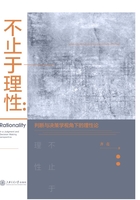The latter alternative had been the thesis which Mandeville had partly made and partly found popular. In his view the most virtuous actions might be resolved into selfishness, and self-love was the starting-point of all morality. This became therefore, one of the favourite topics of speculation;but it is only necessary to notice Hume's treatment of it, inasmuch as it supplies the first principle of Adam Smith's theory. Hume assumed the existence of a disinterested principle underlying all our moral sentiments.
He argued that "a natural principle of benevolence," impelling us to consider the interests of others, was an essential part of human nature. "The very aspect," he said, "of happiness, joy, prosperity, gives pleasure; that of pain, suffering, sorrow communicates uneasiness." And this fellow-feeling with others he had refused to resolve into any more general principle, or to treat as other than an original principle of human nature.
This phenomenon of Sympathy, or fellow-feeling, which we have by nature with any passion whatever of another person, is made by Adam Smith the cardinal point and distinctive feature of his theory of the origin of moral approbation; and the first sentence of his treatise contains therefore not only his answerone of flat contradictionto Mandeville, but the key-note to the whole spirit of his philosophy. "How selfish soever," he begins, "man may be supposed, there are evidently some principles in his nature which interest him in the fortune of others, and render their happiness necessary to him, though he derives nothing from it, except the pleasure of seeing it." So that pity or compassion, which Hobbes had explained as the consciousness of a possible misfortune to ourselves similar to that seen to befall another, is, with Adam Smith, a primary, not a secondary, emotion of our nature, an original and not a derivative passion, and one that is purely disinterested in its manifestation.
In the next chapter and the four succeeding ones we shall observe how on this basis of an original instinct of sympathy Adam Smith constructs his explanation of the origin of our moral ideas. With regard to the explanations already offered by previous writers, he believed that they all contained some portion of the truth from the particular point of view taken by each;and in the explanation which he himself elaborated, he thought that some part or other of his system embraced and coincided with whatever was true in the different theories of his predecessors.
CHAPTER II.THE PHENOMENA OF SYMPATHY.
The phenomena of sympathy or fellow-feeling show, according to Adam Smith, that it is one of the original passions of human nature. We see it in the immediate transfusion of an emotion from one man to another, which is antecedent to any knowledge on our part of the causes of another man's grief or joy. It is a primary factor of our constitution as human beings, as is shown in the instinctive withdrawal of our limbs from the stroke we see aimed at another. It is indeed something almost physical, as we see in the tendency of a mob to twist their bodies simultaneously with the movements of a rope-dancer, or in the tendency of some people on beholding sore eyes to feel a soreness in their own.
Sympathy originates in the imagination, which alone can make us enter into the sensations of others. Our own senses, for instance, can never tell us anything of the sufferings of a man on the rack. It is only by imagining ourselves in his position, by changing places with him in fancy, by thinking what our own sensations would be in the same plight, that we come to feel what he endures, and to shudder at the mere thought of the agonies be feels. But an analogous emotion springs up, whatever may be the nature of the passion, in the person principally affected by it; and whether it be joy or grief, gratitude or resentment, that another feels, we equally enter as it were into his body, and in some degree become the same person with him. The emotion of a spectator always corresponds to what, by bringing the case of another home to himself, he imagines should be that other's sentiments.
But although sympathy is thus an instantaneous emotion, and the expression of grief or joy in the looks or gestures of another affect us with some degree of a similar emotion, from their suggestion of a general idea of his bad or good fortune, there are some passions with whose expression no sympathy arises till their exciting cause is known. Such a passion is anger, for instance. When we witness the signs of anger in a man we more readily sympathize with the fear or resentment of those endangered by it than with the provoked man himself. The general idea of provocation excites no sympathy with his anger, for we cannot make his passion our own till we know the cause of his provocation. Even our sympathy with joy or grief is very imperfect, till we know the cause of it: in fact, sympathy arises not so much from the view of any passion as from that of the situation which excites it. Hence it is that we often feel for another what he cannot feel him- self, that passion arising in our own breast from the mere imagination which even the reality fails to arouse in his. We sometimes, for instance, blush for the rudeness of another who is insensible of any fault himself, because we feel how ashamed we should have felt had his conduct and situation been ours. Our sorrow, again, for an idiot is no reflection of any sentiment of his, who laughs and sings, and is unconscious of his misery; nor is our sympathy with the dead due to any other consideration than the conception of ourselves as deprived of all the blessings of life and yet conscious of our deprivation. To the change produced upon them we join our own consciousness of that change, our own sense of the loss of the sunlight of human affections, and human memory, and then sympathize with their situation by so vividly imagining it our own.














